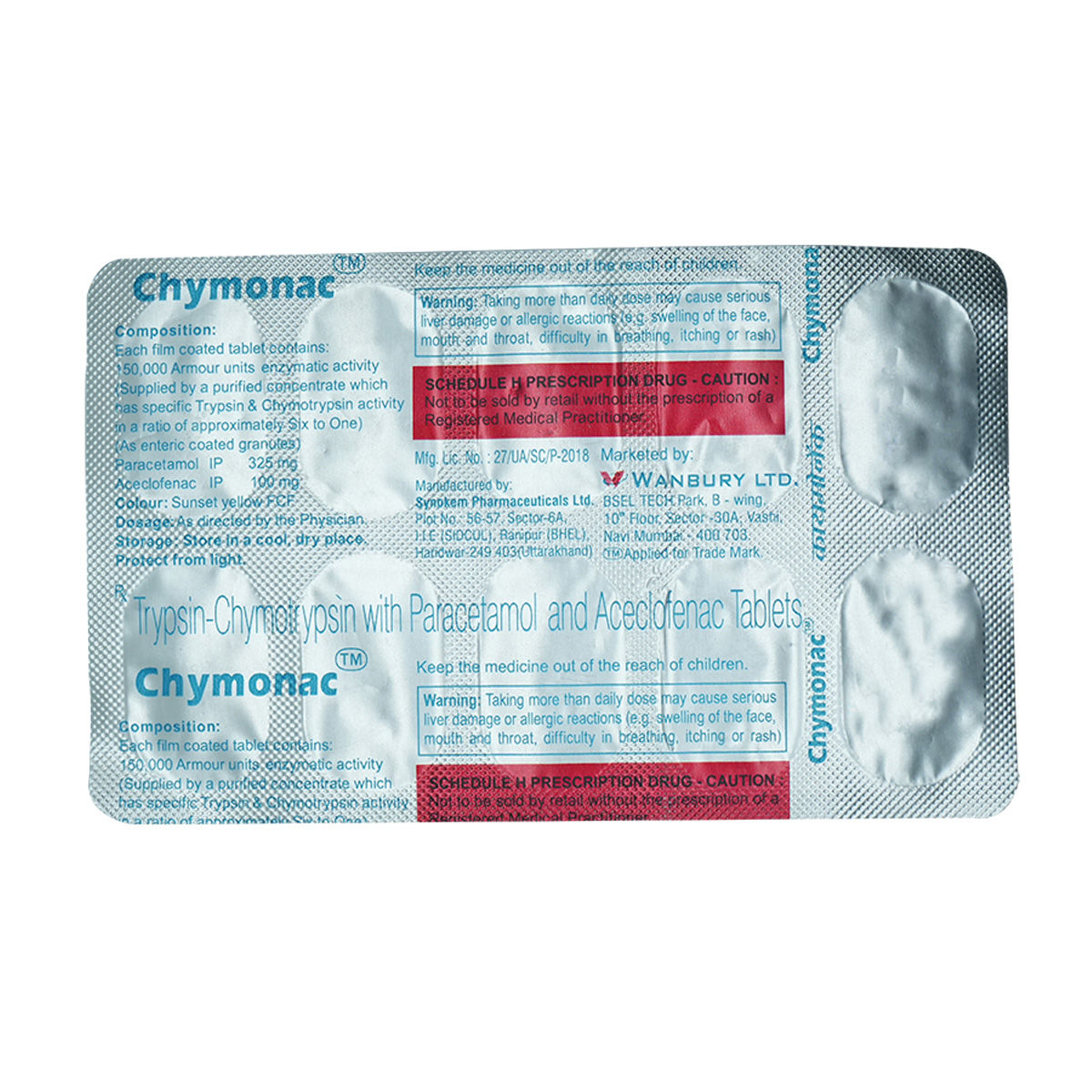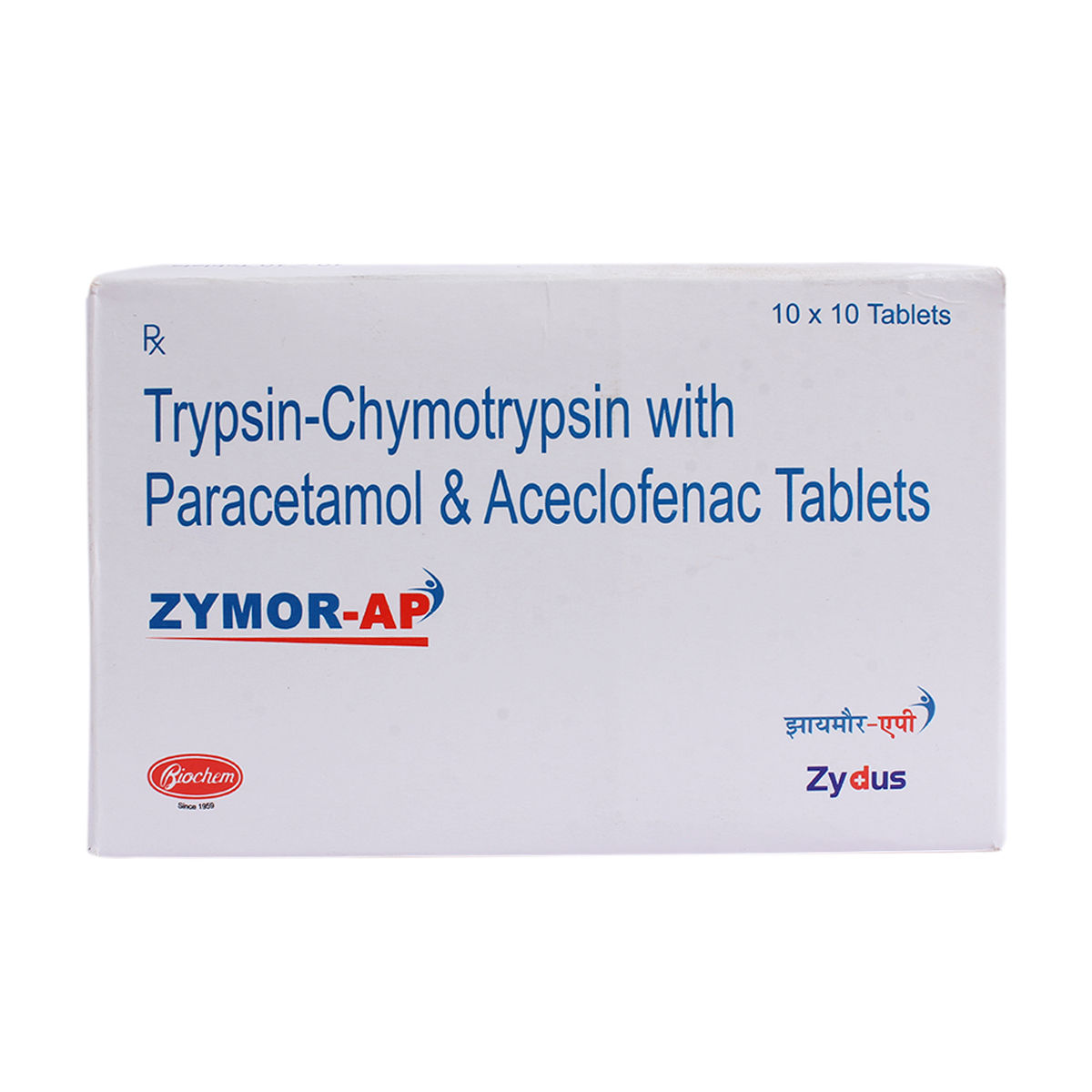Aceclofenac+paracetamol+trypsin Chymotrypsin
About Aceclofenac+paracetamol+trypsin Chymotrypsin
Aceclofenac+paracetamol+trypsin Chymotrypsin is a combination medicine used to relieve pain and inflammation associated with osteoarthritis, rheumatoid arthritis, spondylosis, spondyloarthritis, and ortho-degenerative disorders. Pain is a symptom triggered by the nervous system, causing uncomfortable sensations in the body. Arthritis, also known as joint inflammation, is the tenderness and swelling of the joints. Symptoms include swelling, pain, and stiffness.
Aceclofenac+paracetamol+trypsin Chymotrypsin is a combination of three drugs, namely: Aceclofenac, Paracetamol, and Trypsin chymotrypsin. Aceclofenac and Paracetamol work by blocking the effect of chemical messengers called prostaglandins by inhibiting cyclooxygenase (COX) enzymes, thereby reduces mild to moderate pain and inflammation at the injured or damaged site. Trypsin chymotrypsin breaks down the abnormal proteins at the site of inflammation, thereby reduces swelling and inflammation.
You are advised to take Aceclofenac+paracetamol+trypsin Chymotrypsin for as long as your doctor has prescribed it for you, depending on your medical condition. In some cases, you may experience certain common side-effects such as nausea, vomiting, stomach pain, loss of appetite, indigestion, and diarrhoea. Most of these side effects do not require medical attention and will resolve gradually over time. However, you are advised to talk to your doctor if you experience these side effects persistently.
Consult your doctor if you are pregnant or breastfeeding. Aceclofenac+paracetamol+trypsin Chymotrypsin may cause drowsiness and dizziness, so drive with caution. Aceclofenac+paracetamol+trypsin Chymotrypsin is not recommended for children as safety and efficacy have not been established. Avoid consuming alcohol with Aceclofenac+paracetamol+trypsin Chymotrypsin as it could lead to increased drowsiness and dizziness; it might also increase the risk of stomach bleeding. Keep your doctor informed about your health condition and medicines to rule out any side effects/interactions.
Uses of Aceclofenac+paracetamol+trypsin Chymotrypsin
Medicinal Benefits
Aceclofenac+paracetamol+trypsin Chymotrypsin is a combination of three drugs, namely: Aceclofenac, Paracetamol, and Trypsin chymotrypsin. Aceclofenac+paracetamol+trypsin Chymotrypsin is used to relieve pain and inflammation associated with osteoarthritis, rheumatoid arthritis, spondylosis, spondyloarthritis, and ortho-degenerative disorders. Aceclofenac is an NSAID (Non-Steroidal Anti-Inflammatory Drug) and Paracetamol is an analgesic. Aceclofenac and Paracetamol work by blocking the effect of chemical messengers called prostaglandins by inhibiting cyclooxygenase (COX) enzymes, thereby reducing mild to moderate pain and inflammation at the injured or damaged site. Trypsin chymotrypsin is a combination of enzymes that breaks down the abnormal proteins at the site of inflammation, thereby reducing swelling and inflammation by increasing the blood supply at the affected area.
Directions for Use
Storage
Side Effects of Aceclofenac+paracetamol+trypsin Chymotrypsin
- Nausea
- Vomiting
- Stomach pain
- Diarrhoea
- Indigestion
- Loss of appetite
- Heartburn
Drug Warnings
Do not take Aceclofenac+paracetamol+trypsin Chymotrypsin if you are allergic to any of its contents; if you have/had severe heart problems, active or recurring peptic ulcer, gastrointestinal perforation, bleeding problems, inflammation of intestines, severe liver or kidney impairment. Inform your doctor if you have/had high blood pressure, heart problems, high cholesterol, diabetes, asthma, angina, bowel problems, blood clotting disorder, a habit of smoking, liver or kidney problems. Consult your doctor if you are pregnant or breastfeeding. Stop taking Aceclofenac+paracetamol+trypsin Chymotrypsin and consult your doctor immediately if you have stomach pain or any signs of bleeding in the intestine or stomach, such as blood in stools.
Drug Interactions
Drug-Drug Interactions: Aceclofenac+paracetamol+trypsin Chymotrypsin may interact with pain killers (aspirin), anti-coagulant (warfarin, coumadin, heparin, clopidogrel), antibiotic (chloramphenicol), cardiac glycoside (digoxin), anti-maniac agent (lithium), immunosuppressant (methotrexate, tacrolimus, ciclosporin), antiprogestational steroids (mifepristone), anti-retroviral (zidovudine), anti-hypertensives, diuretics, and corticosteroids.
Drug-Food Interactions: No interactions found/established.
Drug-Disease Interactions: Inform your doctor if you have/had severe heart problems, active or recurring peptic ulcer, gastrointestinal perforation, bleeding problems, inflammation of intestines, severe liver or kidney impairment.
Drug-Drug Interactions Checker List:
Safety Advice

Alcohol
unsafeAvoid consumption of alcohol while taking Aceclofenac+paracetamol+trypsin Chymotrypsin as it may increase drowsiness. It may also increase the risk of stomach bleeding.

Pregnancy
cautionPlease consult your doctor if you have any concerns; your doctor will prescribe only if the benefits outweigh the risks.

Breast Feeding
cautionConsult your doctor if you are breastfeeding; your doctor will decide whether Aceclofenac+paracetamol+trypsin Chymotrypsin can be taken by breastfeeding mothers or not.

Driving
cautionAceclofenac+paracetamol+trypsin Chymotrypsin may cause dizziness and drowsiness. Do not drive or operate machinery unless you are alert.

Liver
cautionDose adjustment may be needed in patients with liver impairment. Please consult your doctor if you have a liver impairment or any concerns regarding this. Aceclofenac+paracetamol+trypsin Chymotrypsin is not recommended for patients with severe hepatic impairment.

Kidney
cautionDose adjustment may be needed in patients with kidney impairment. Please consult your doctor if you have kidney impairment or any concerns regarding this. Aceclofenac+paracetamol+trypsin Chymotrypsin is not recommended for patients with severe renal impairment.

Children
unsafeAceclofenac+paracetamol+trypsin Chymotrypsin is not recommended for children as safety and effectiveness have not been established.
Habit Forming
Diet & Lifestyle Advise
- Physical activity helps in strengthening muscles and relieves joint stiffness. Gentle activities like 20-30minutes of walking or swimming would be helpful.
- Performing yoga may also help in improving joint flexibility and pain management.
- Maintain a healthy weight by performing regular low-strain exercises and eating healthy food.
- Get adequate sleep, as resting the muscles can help in reducing inflammation and swelling.
- De-stress yourself by meditating, reading books, taking a warm bubble bath or listening to soothing music.
- Acupuncture, massage and physical therapy may also be helpful.
- Eat food rich in antioxidants such as berries, spinach, kidney beans, dark chocolate, etc.
- Foods containing flavonoids help in reducing inflammation. These include soy, berries, broccoli, grapes and green tea.
- Avoid smoking and alcohol consumption.
Patients Concern
Disease/Condition Glossary
Pain: Pain is a symptom triggered by the nervous system, causing uncomfortable sensations in the body. Pain may be dull or sharp; it might be constant or may come and go. The tolerance level of pain might vary from person to person. Pain can be generalized (overall body aches) or localized (affecting a specific area of the body). The common causes of pain include headache, muscle strain, cramps, cuts, bone fractures, and arthritis.
Osteoarthritis: It is a joint disease in which the two ends of the joints come together due to the breakdown of a protective covering called cartilage. Due to the absence of this protective covering, the joints rub against each other, leading to pain and stiffness. Symptoms include pain, stiffness, inflammation and tenderness.
Rheumatoid arthritis: It is an auto-immune disease (the body's immune system attacks its tissue), leading to joint pain and damage. Symptoms of rheumatoid arthritis include pain, swelling, stiffness, deformities and loss of joint function.
Spondylosis: It is a degenerative condition of the spine due to the wear and tear of the spinal discs. It is osteoarthritis of the spine, a common condition which worsens with age.
Spondyloarthritis: It is an inflammatory disease that affects the pelvis, back, neck, chest, spine, fingers, knees, toes, and some larger joints.
FAQs
Aceclofenac+paracetamol+trypsin Chymotrypsin is used to relieve pain and inflammation associated with musculoskeletal and joint disorders.
Aceclofenac+paracetamol+trypsin Chymotrypsin contains Aceclofenac, Paracetamol, and Trypsin chymotrypsin. Aceclofenac and Paracetamol work by blocking the effect of chemical messengers that cause pain and inflammation. Trypsin chymotrypsin breaks down the abnormal proteins at the site of inflammation, thereby reducing swelling and inflammation.
Aceclofenac+paracetamol+trypsin Chymotrypsin is used to reduce and relieve pain and inflammation associated with osteoarthritis, rheumatoid arthritis, spondylosis, spondyloarthritis, and ortho-degenerative disorders. Arthritis is tenderness and swelling in the joints.
Do not take any other medicines for pain relief such as NSAIDs along with Aceclofenac+paracetamol+trypsin Chymotrypsin unless prescribed by the doctor as it might increase the risk of side effects.
Avoid exceeding the dose and duration advised by the doctor. Taking more than the daily dose of Aceclofenac+paracetamol+trypsin Chymotrypsin might cause serious liver damage or allergic reactions like rash, difficulty in breathing, and swelling of the face, throat, and mouth. Therefore, Aceclofenac+paracetamol+trypsin Chymotrypsin should not be taken for longer durations unless prescribed by the doctor.
Avoid taking Aceclofenac+paracetamol+trypsin Chymotrypsin if you have ulcers in the stomach or intestines, bleeding problems, or heart problems. Talk to your doctor if you have any concerns.
Please consult your doctor if are pregnant or planning pregnancy before taking Aceclofenac+paracetamol+trypsin Chymotrypsin. Your doctor will prescribe Aceclofenac+paracetamol+trypsin Chymotrypsin only if the benefits outweigh the risks.
Aceclofenac+paracetamol+trypsin Chymotrypsin should be taken as advised by the doctor. It is preferably taken with food to avoid stomach upset.
Yes, Aceclofenac+paracetamol+trypsin Chymotrypsin is a painkiller as well as anti-inflammatory drug. It contains aceclofenac and paracetamol which possess pain relieving action.
Aceclofenac+paracetamol+trypsin Chymotrypsin should be avoided by patients with severe kidney or liver problems. Also, inform your doctor if you have heart-related diseases, hypertension (high blood pressure) or bleeding disorder, etc.
Aceclofenac+paracetamol+trypsin Chymotrypsin may cause side effects such as nausea, vomiting, stomach pain, diarrhoea, loss of appetite, indigestion and heartburn. If these side effects persist or worsen, please consult your doctor.
Aceclofenac+paracetamol+trypsin Chymotrypsin may be used or recommended to provide relief from tooth pain and swelling after a tooth extraction. However, do not self-medicate as it may cause unwanted side effects.
No, there are no reports of Aceclofenac+paracetamol+trypsin Chymotrypsin addiction in patients.
Aceclofenac+paracetamol+trypsin Chymotrypsin should be continued for as long as it is advised by your doctor. It can be discontinued if you are using it for short-term when your pain is relieved.
Yes, the use of Aceclofenac+paracetamol+trypsin Chymotrypsin can cause dizziness (feeling faint, lightheaded, weak, or unsteady) in some patients. If you experience dizziness or lightheadedness, it is best to take rest for some time and resume once you feel better.
Yes, the long-term use of Aceclofenac+paracetamol+trypsin Chymotrypsin can cause damage to the kidneys. Normal kidneys produce prostaglandins, a chemical that protects them from damage. Long term use of painkillers lowers the prostaglandins levels in the body leading to kidney damage. Therefore, painkillers are not recommended to patients with underlying kidney disease.
Aceclofenac+paracetamol+trypsin Chymotrypsin contains Paracetamol, which is known to harm the liver especially when taken in more than recommended doses. Also, avoid alcohol consumption while taking Aceclofenac+paracetamol+trypsin Chymotrypsin, as it may further increase the risk of liver damage. Also, Aceclofenac+paracetamol+trypsin Chymotrypsin is preferably avoided in patients with underlying liver disease. If you notice any early signs and symptoms of liver damage such as yellow skin or eyes, dark urine, fever, stomach pain, nausea, vomiting, loss of appetite, rash, fatigue (overtiredness) and abnormal liver enzymes, contact your doctor immediately.
It may take about an hour to experience the first benefit of pain relief after taking Aceclofenac+paracetamol+trypsin Chymotrypsin.
If you forget to take a dose of Aceclofenac+paracetamol+trypsin Chymotrypsin, take it as soon as you remember. However, if it is almost time for your next dose, skip the missed dose and take the next scheduled dose in the prescribed time. Do not double the dose to make up for the missed one as this may increase the risk of side effects.
No, taking a higher than the recommended dose may not be more effective, rather it may increase the risk of toxicity and serious side effects. If your symptoms are not relieved or there is an increased severity of your symptoms after using the recommended doses, please consult your doctor.
Aceclofenac+paracetamol+trypsin Chymotrypsin is contraindicated in patients with known allergy to any of its ingredients. Patients with a history of stomach ulcers or active, recurrent stomach ulcer/bleeding should ideally avoid taking Aceclofenac+paracetamol+trypsin Chymotrypsin. Additionally, patients with a history of high blood pressure, heart failure, and kidney or liver disease, should also avoid taking Aceclofenac+paracetamol+trypsin Chymotrypsin.






